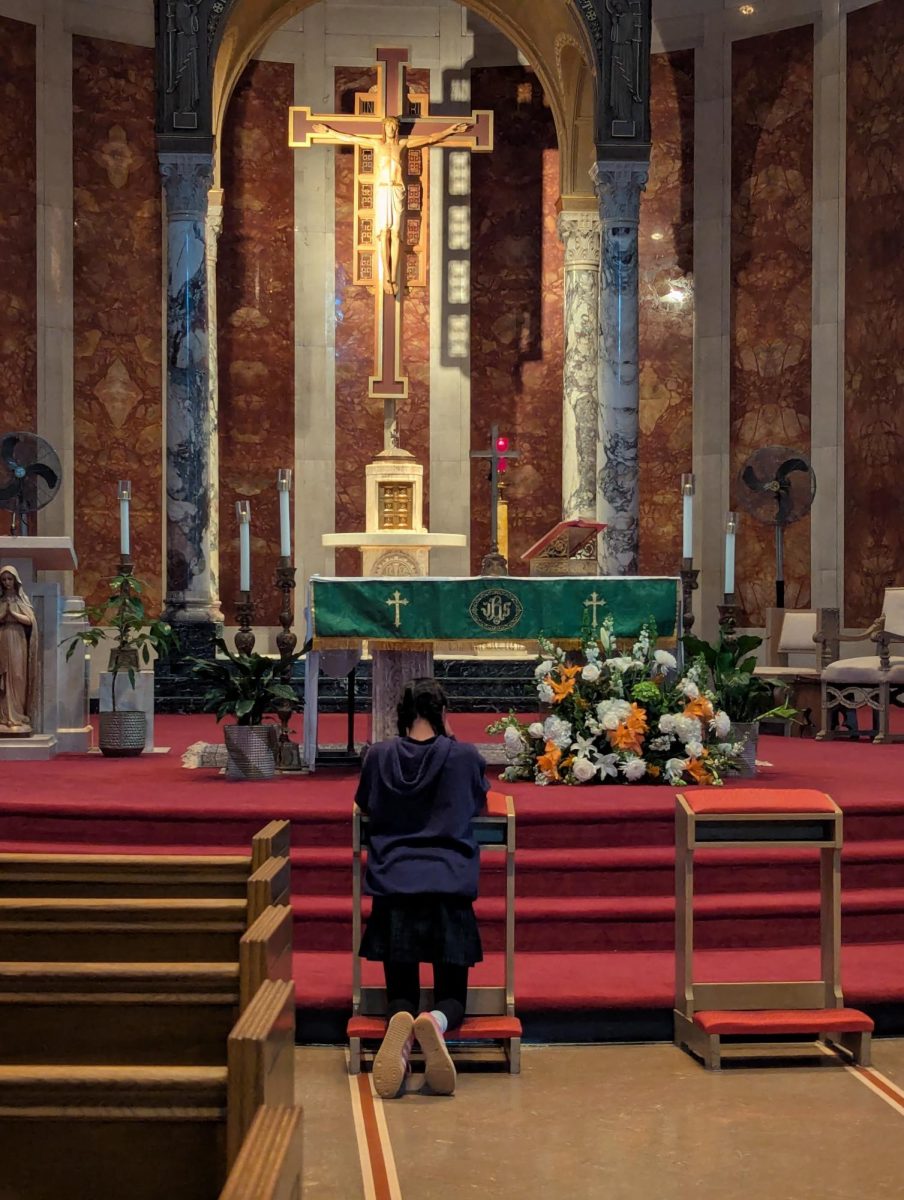Adoration is one of the many Catholic customs that is practiced across the world. Adoration can be defined as a prayer in which people lift their minds and hearts to God in the presence of the Eucharist. A gold monstrance (from the Latin word for “to show”) holds the Eucharist, which shows that God and Jesus are present. Unbeknownst to many Catholics, Adoration has actually been around since the days of the early Christian Church. The Eucharist was being reserved regularly after Mass (held safe after Mass) by the time the Council of Nicaea was held in 325. While Catholics understand this to be a sacred process due to the presence of Christ in the Eucharist, other Christians may find this concept more difficult to understand. According to Dr. Pudner (A religion teacher at St. Robert), Adoration was established to allow worshipers to spend time with God and understand the complexity of the Eucharist and Jesus in his complete body.
Music is often played while Adoration takes place. Everyone is a creation with a body and soul and people experience things through their senses. Through one’s senses, people can be drawn to God in their midst. When there is religious music playing during Adoration, people tend to become calmer and focus more on God. However, some people prefer silence, so St. Robert does have times when Adoration is silent. People are then able to concentrate with God if they feel distracted by the musical accompaniment. When music is offered, a variety of genres are used: contemporary praise and worship, Gregorian chant, traditional hymns, and other instrumental and vocal music are used during Adoration.
Confession is often offered during Adoration as well. Going to Confession during Adoration makes it easier for people to offer Jesus into their hearts. By going to Confession during Adoration, people can lighten the burdens of their hearts during Adoration because their sins don’t hold them down. Fr. Charles explained that talking to Jesus is easier when people aren’t holding the guilt of their sins. Many students at St. Robert choose to go to Confession during Adoration. One student, 6th grader Anna, says, “I like how I can talk to God, and then ask for forgiveness.”
If someone were to ever be at Adoration, but is unsure what to do, they can choose to pray pre-written prayers, such as prayers of contrition (asking for forgiveness), prayers of thanksgiving (giving thanks), prayers of supplication (asking for something), or prayers of adoration (adoring Christ or others that are extemporaneous). Meditation is also widely used in Adoration due to the relaxing feeling of just being in the presence of the Lord. Many people like to bring journals to Adoration in order to better organize their thoughts and conversations with God. Some people write as little as a few thoughts while others write whole pages to God.
While people who grew up going to church and Adoration may know what they are doing, when someone partakes in Adoration for the first time, they may find it trying. Some people avoid Adoration because they may not believe or fully understand the significance of Jesus’ True Presence in the Eucharist, and others may think that going to Adoration is a waste of time. Others struggle with Adoration because they struggle with sitting still and staying quiet long enough for the service to happen. Most people are used to distracting themselves with devices, books, or anything that they enjoy doing, so being in Adoration – where they have to spend time with God, and God alone – they struggle with staying in the right mindset. However, as Dr. Pudners shares, “Practice makes perfect” is the golden rule in Adoration; people have to practice to understand and be willing to spend time with God.
Many people, including Fr. Charles, report that Adoration improves overall mental health. Fr. Charles says that “Jesus Christ is better for mental health because he came to restore what is broken and that includes all of us and our lives, and when we encounter Jesus deeply, we experience healing so in that aspect adoration is good for mental health.” In other words, he states that God can help heal minds in the act of Adoration. Adoration can also help put people’s focus back on Christ when they lose that focus. If people refocus their lives back on Jesus Christ, they can be calmer and have a better experience when doing activities according to Ms. Mathews.
Adoration is very important, but this experience truly begins in the celebration of Mass. During Mass, the priest holds up the Eucharist for the whole Church to see. Adoration is an expanded version of that moment. People go to Adoration for the same reason that they go to Mass: to improve their relationship with God through experiencing the Eucharist. As Fr. Charles noted, if people forgot about their faith and looked at all the bad things in the world, their life would start to reflect that and be sinful. If people look to Jesus and follow his life, they would inflict that on their lives and would live a better and happier life.






Lauren Beckmann • Oct 17, 2024 at 4:24 pm
Great journalistic prowess! Your overview of a religious practice with deep theological implications is written in an approachable style for a range of readers from non-Catholics to experienced adorers. A nice way to evangelize!
Mindy Ours-Evans • Oct 10, 2024 at 6:28 pm
Great explanation!!!